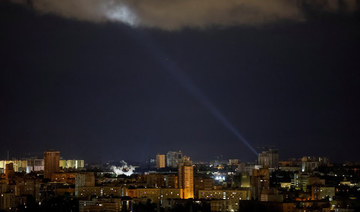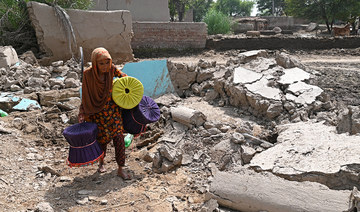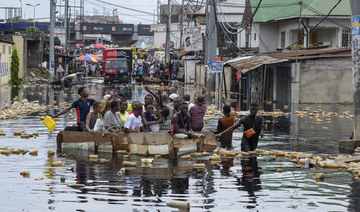LONDON: A London judge said Thursday he would rule as soon as possible on whether to throw out or limit a phone hacking lawsuit brought by Prince Harry, Elton John and other well-known figures against a British tabloid publisher.
The Duke of Sussex made a late arrival and early departure for the finale of a four-day High Court hearing on his invasion of privacy case against the company that publishes The Daily Mail. His surprise appearance during three days of the legal wrangling indicates the lawsuit’s importance in the prince’s broader battle against the British press.
Harry, John, and actresses Elizabeth Hurley and Sadie Frost are among a group of seven people suing Associated Newspapers Ltd. for allegedly paying private investigators to illegally bug homes and cars and to record phone conversations.
The publisher denied the allegations and has argued that lawsuits based on alleged incidents dating as far back as 1993 should be thrown out because the cases were not filed within a six-year limitation period.
Attorney David Sherborne, who represents Harry and the other famous claimants, argued that the deadline for filing the lawsuits should be extended because the alleged snooping was covert and the publisher concealed evidence of it through denials “likely to lead the claimants off the scent.”
The claimants said they were unaware of phone hacking done for Associated Newspapers until private investigators, including Gavin Burrows, came forward in the last couple of years to disclose the covert work they allegedly did.
Burrows, who said in a 2021 witness statement that he came forward to “do the right thing” and help the people he targeted, has since issued another sworn statement saying he had not been commissioned by Associated Newspapers to do unlawful work.
In his earlier admission, however, he described how much he charged for different jobs and how Harry, John and his husband, David Furnish, and Hurley and Frost were “just a small handful of my targets.”
He said he “must have done hundreds of jobs” between 2000 and 2005 for a Mail on Sunday journalist whose name is redacted.
In one section cited by Sherborne, Burrows described tapping Hurley’s home phone, hacking her voicemail and digging up travel and medical details on her when she was pregnant. Burrows said that John didn’t have a mobile phone but he got a lot of information about the singer from Hurley’s phone because she was close friends with him, and through the phone of John’s gardener.
“I hacked, tapped and bugged Liz a number of times,” Burrows said in his earlier statement. “She (like Hugh Grant) was a huge earner for me. I could get an itemized phone bill for Liz and Hugh and sell each one for 5,000 pounds (about $6,185), much more than the average price on my menu.”
Until she read Burrows statement, Hurley did not know who had been the source of the information about her, Sherborne said.
“That’s the trigger. That’s when the scales fall from her eyes,” Sherborne said.
Attorney Adrian Beltrami said the claims had been brought “far too late” and should be tossed out. He argued that a national scandal on phone hacking by journalists at other papers a decade ago could have inspired the claimants to look into articles written about them and file their lawsuits alleging wrongdoing within the time limits.
Justice Matthew Nicklin said there was a difference between applying time limits to discovery of the alleged unlawful information gathering and the articles that resulted from some of those acts.
“It’s clear what the claimants are not entitled to pursue because of limitation,” Nicklin said. “But what they are entitled to pursue is slightly more nuanced than simply striking out reference to the articles.”
Attorney Steven Heffer, who is not involved in the case, said the defense is unlikely to prevail at this stage if they concealed the unlawful activity.
“Other newspaper groups emphatically denied phone hacking or any unlawful information gathering, but have had to pay millions in damages and costs,” Heffer said.
The publisher is also seeking to have evidence of payments to investigators barred from being used by claimants because it was protected by confidentiality rules when it was turned over by the publisher to a government inquiry into media law breaking.
Sherborne argued the evidence is in the public domain.
Attorney Michael Gardner, who also is not involved in the litigation, said Harry and the other claimants face an uphill battle on several fronts.
“First, the events in question took place so long ago that they may now be statute barred,” Gardner said. “Secondly, the evidence they are relying on includes material that may be inadmissible. Thirdly, a key witness in the case appears to have signed two completely contradictory statements.”
Prince Harry back in court for phone hacking hearing finale
https://arab.news/wuk6h
Prince Harry back in court for phone hacking hearing finale

- The Duke of Sussex made a late arrival and early departure for the finale of a four-day High Court hearing on his invasion of privacy case
- The publisher denied the allegations and has argued that lawsuits based on alleged incidents dating as far back as 1993 should be thrown out
Saudi eye surgeons help 1,000 Sri Lankans regain sight

- KSrelief team consists of doctors from Saudi Arabia and Pakistan
- Untreated cataracts are the most common cause of blindness in Sri Lanka
COLOMBO: A Saudi eye surgeon team is helping 1,000 people in Sri Lanka regain sight with interventions facilitated by the King Salman Humanitarian Aid and Relief Center.
KSrelief’s Saudi Noor Volunteer Program to Combat Blindness started in the city of Kattankudy on Sri Lanka’s eastern coast on May 5 and will run through next week.
“This is a special program to combat blindness among patients who are suffering from a cataract,” M.S.M. Thassim, director general of KSrelief’s local partner, the Association of Muslim Youth of Sailan, told Arab News.
“From the total of 1,000 patients, 500 completed surgery and 500 more (surgeries) will be performed by May 16.”
Cataracts are the most common cause of blindness in Sri Lanka. Surgery to remove them is common, but government programs often require years of waiting. At private clinics, the cheapest lens replacement procedure costs about $300 — too expensive for many patients in poorer parts of the country.
“Cataracts are becoming a problem among the lower-middle class above the age of 40,” Thassim said.
“We perform cataract surgery and also give post-surgery treatment. The patients are from all parts of the island.”
The procedures are free of cost and conducted at the Kattankudy Base Hospital by Sri Lankan medics and six Saudi and Pakistani surgeons from KSrelief’s team.
One of the Saudi volunteers is Dr. Ehab Al-Sirhy, an eye surgeon from King Saud University Medical City in Riyadh.
“The amount of surgery done is an amazing number in such a short period,” he told Arab News, praising local hospital staff for their “excellent logistics and support.”
The medical campaign is part of KSrelief’s longstanding efforts to combat blindness in developing countries. Last year, the center’s team also visited Kattankudy and helped restore the vision of hundreds of patients.
“The results are very encouraging, so now everyone brings their friends and relatives, their grandmothers, their grandfathers,” Al-Sirhy said. “The (campaign’s) reputation is excellent.”
Russia claims more advances after Ukraine ground offensive

- Russia’s defense ministry said its troops had ‘liberated’ five border villages in the Kharkiv region
- The Kharkiv region has been mostly under Ukrainian control since September 2022
UKRAINE: Russia on Saturday said it had captured six villages in Ukraine’s east after launching a surprise ground offensive that prompted mass evacuations.
The defense ministry said its troops had “liberated” five villages in the Kharkiv region near the border with Russia — Borisivka, Ogirtseve, Pletenivka, Pylna and Strilecha — “as a result of offensive actions.”
The village of Keramik in the Donetsk region was also now under Russian control, it said.
Ukrainian officials said Russian forces made small advances in the area it was pushed back from nearly two years ago, the latest in a series of gains as Ukrainian forces find themselves outgunned and outmanned.
“A total of 1,775 people have been evacuated,” Kharkiv governor Oleg Synegubov wrote on social media.
He reported Russian artillery and mortar attacks on 30 settlements over the past 24 hours.
Groups of people could be seen coming in vans and cars with as many bags as they could carry at an evacuation arrival point outside the city of Kharkiv.
Evacuees — many of them elderly — registered and received food and medical assistance in makeshift tents.
“We must disrupt Russian offensive operations and return the initiative to Ukraine,” Ukrainian President Volodymyr Zelensky said on Saturday.
Ukrainska Pravda quoted military sources saying the Russian assault had resumed on Saturday near the village of Glyboke in Kharkiv.
The report could not be independently verified.

The Kharkiv region has been mostly under Ukrainian control since September 2022.
A senior Ukrainian military source said on Friday that Russian forces had advanced one kilometer into Ukraine and were trying to “create a buffer zone” in the Kharkiv and neighboring Sumy regions to prevent attacks on Russian territory.
Ukrainian forces have multiplied attacks inside Russia and Russian-held areas of Ukraine, particularly on energy infrastructure.
Moscow-installed authorities in the Russian-occupied Lugansk region in eastern Ukraine said four people were killed by a Ukrainian strike with US-made missiles on an oil depot in Rovenky.
Governor Leonid Pasechnik said the strike “enveloped the oil depot in fire and damaged surrounding homes.”
In Russia, two people were reported killed by Ukrainian strikes in the Belgorod and Kursk regions.
Ukrainian officials also reported a total of six civilians killed in Russian shelling in the Donetsk, Kharkiv and Kherson regions over the past day.
Officials in Kyiv had warned for weeks that Moscow might try to attack its northeastern border regions, pressing its advantage as Ukraine struggles with delays in Western aid and manpower shortages.
Ukraine’s military said it had deployed more troops and Zelensky said Ukrainian forces were using artillery and drones to thwart the Russian advance.
“Reserve units have been deployed to strengthen the defense in this area of the front,” it said.
The US-based Institute for the Study of War said on Friday that Russia had made “tactically significant gains.”
But the main aim of the operation was “drawing Ukrainian manpower and material from other critical sectors of the front in eastern Ukraine,” it said.
ISW said it did not appear to be “a large-scale sweeping offensive operation to envelop, encircle and seize Kharkiv” — Ukraine’s second biggest city.
Washington announced a new $400 million military aid package for Kyiv hours after the offensive began, and said it was confident Ukraine could repel any fresh Russian campaign.
Heavy rains set off flash floods in northern Afghanistan, killing at least 200 people: UN report says

ISLAMABAD: Flash floods from seasonal rains in Baghlan province in northern Afghanistan killed at least 200 people on Friday, UN report said.
The floods also caused losses to homes and property in several districts, according to Edayatullah Hamdard, the provincial director of Natural Disaster Management in Baghlan. He said that the death toll was preliminary and that it “might rise as many people are missing.”
The flash floods also hit the capital, Kabul, said Abdullah Janan Saiq, the Taliban’s spokesman for the State Ministry for Natural Disaster Management. He said that rescue teams bringing food and other aid have been dispatched to the affected areas.
Saiq said that the rescue operation is the main focus of authorities at the moment, and that he later might be able to provide more precise figures on casualties and damage.
Emergency personnel were “searching for any possible victims under the mud and rubble, with the help of security forces from the national army and police,” Hamdard said earlier.
Dozens of tents, blankets and food were provided to those who lost their homes, he added.
Video footage seen on social media showed huge torrents of muddy water swamping roads and bodies shrouded in white and black cloth.
In one video clip, children are heard crying and a group of men are looking at floodwaters, in which bits of broken wood and debris from homes can be seen.
Since mid-April, flash flooding and other floods have left about 100 people dead in 10 of Afghanistan’s provinces, with no region entirely spared, according to authorities.
Farmland has been swamped in a country where 80 percent of the more than 40 million people depend on agriculture to survive.
Rains on Friday also caused heavy damages in northeastern Badakhshan province and central Ghor province, officials said.
Taliban government spokesman Zabihullah Mujahid said authorities would provide support to those impacted by the flooding across the country.
The government “expresses its deep sympathy with the families of dead and wounded, and instructs the ministry of natural disaster management, ministries of defense and interior, and provincial authorities to spare no resource in rescue efforts,” he said in a statement on X, formerly Twitter.
Mohammad Akram Akbari, the provincial director of natural disaster management in Badakhshan, said the mountainous province had seen “heavy financial losses in several areas... due to floods.”
He added that casualties were feared in Tishkan district, where flooding had blocked a road and cut off access to an area where some 20,000 people lived.
Afghanistan — which had a relatively dry winter, making it more difficult for the soil to absorb rainfall — is highly vulnerable to climate change.
In April, at least 70 people died from heavy rains and flash flooding in the country. About 2,000 homes, three mosques, and four schools were damaged last month. Thousands of people require humanitarian assistance. The flooding also damaged agriculture land and 2,500 animals died in the deluges, according to Saiq.
The nation, ravaged by four decades of war, is one of the poorest in the world and, according to scientists, one of the worst prepared to face the consequences of global warming.
Afghanistan, which is responsible for only 0.06 percent of the world’s greenhouse gas emissions, ranks sixth on the list of countries most at risk from climate change, experts say.
Half of Afghanistan’s population lives under the poverty line, and 15 million people are experiencing food insecurity, according to the World Bank.
Police arrest dozens as they break up pro-Palestinian protests at several US universities

- Israel has killed more than 34,700 Palestinians, according to Gaza’s Health Ministry
- Nearly 2,900 people have been arrested at 57 colleges and universities
NEW YORK: Police made dozens of arrests as pro-Palestinian protest encampments were dismantled Friday at the University of Pennsylvania and the Massachusetts Institute of Technology, hours after police tear-gassed demonstrators and took down a similar camp at the University of Arizona.
Philadelphia and campus police at Penn took action around daybreak to remove protesters from an encampment in place for more than two weeks. School officials said protesters were given warnings and the chance to leave without being detained. About 33 people, including faculty members and seven students, were among those arrested and charged with trespass, the school said.
Protest camps have sprung up across the US and in Europe in recent weeks as students demand their universities stop doing business with Israel or companies that support its war efforts. Organizers seek to amplify calls to end Israel’s war against Hamas in Gaza, which they describe as a genocide against the Palestinians. The top United Nations court has concluded there is a “plausible risk of genocide” in Gaza — a charge Israel strongly denies.
In Cambridge, Massachusetts, police in riot gear arrived at MIT around 4 a.m., encircled the camp and gave protesters about 15 minutes to leave. Ten students who remained were arrested, the university’s president said. A crowd outside the camp began chanting pro-Palestinian slogans but was quickly dispersed.
At the University of Arizona in Tucson, campus police in riot gear fired tear gas at protesters late Thursday — the day before the school’s main commencement ceremony — before tearing down an encampment that included wood and plastic barriers. The school said police vehicles were spiked, and rocks and water bottles were thrown at officers and university staff. Two people were arrested, a university spokesperson said. Friday night’s commencement will go forward, university President Robert Robbins said.
And at New Mexico State University in Las Cruces, police arrested 13 people Thursday night after they refused to leave a damaged and vandalized building. The charges ranged from misdemeanor trespass to felonies including battery on a peace officer, school spokesperson Amanda Bradford said. The building, Hadley Hall, was cleared and open Friday.
Protesters at the University of Wisconsin-Madison agreed Friday to permanently dismantle their 2-week-old encampment and not disrupt graduation ceremonies this weekend, in return for the opportunity to connect with “decision-makers” who control university investments by July 1. The university agreed to increase support for scholars and students affected by wars in Gaza and Ukraine.
Graduates from Pomona College in Southern California will have to travel 40 miles (65 km) for their commencement ceremony Sunday, as administrators seek to avoid a current encampment. The college said it will provide transportation to the venue, a historic theater in Los Angeles. In April, protesters entered an administration building and police arrested 20 people.
The protest movement began nearly three weeks ago at Columbia University in New York City. Some colleges nationwide cracked down immediately, while others tolerated the demonstrations. Some recently started calling in the police, citing concerns about disruptions to campus life and safety.
The Associated Press has recorded at least 75 instances since April 18 in which arrests were made at US campus protests. Nearly 2,900 people have been arrested at 57 colleges and universities. The figures are based on AP reporting and statements from schools and law enforcement agencies.
Arizona State University on Friday confirmed that it had placed its campus police chief on paid administrative leave pending a review of “complaints filed related to his actions” two weeks ago when an encampment was removed and police made more than 70 arrests during a pro-Palestine rally on the campus in Tempe.
The school said it was reviewing actions surrounding the establishment and removal of the encampment. Local news outlets reported earlier that ASU Police Chief Michael Thompson had been placed on leave after he had been seen out of uniform cutting and removing tents during the protest. The school told ABC15 Arizona earlier he had left a meeting to respond to the rally.
Although their encampment was cleared after two weeks, demonstrators at George Washington University vowed Friday to keep up their protest campaign.
Police arrested 33 people on Wednesday while ousting the initial encampment. The next night, a crowd of chanting demonstrators returned to the university about five blocks from the White House, setting up tents while a large Metropolitan Police Department force assembled. After multiple warnings to disperse, protests leaders ended the demonstration around midnight. One person was arrested for throwing water at a police officer.
The move at MIT came several days after police first attempted to clear the camp, only to see protesters storm past barriers and restore the encampment, which includes about a dozen tents in the heart of the campus in Cambridge.
Before removing the encampment, MIT earlier in the week started suspending dozens of students, meaning they’re barred from academic activities or commencement.
Protesters insist they will keep demanding MIT cut all ties to the Israeli military. The encampment was up for weeks and especially angered Jewish students, who held counterprotests nearby.
“This is only going to make us stronger. They can’t arrest the movement,” said Quinn Perian, an undergraduate student and organizer for MIT Jews for Ceasefire. “MIT would rather arrest and suspend some students than they would end their complicity with the genocide going in Gaza.”
MIT President Sally Kornbluth, in a letter confirming Friday’s arrests, wrote that her responsibility is “to make sure that the campus is physically safe and functioning for everyone ... and that everyone feels free to express their views.” The encampment, she wrote, “increasingly made it impossible to meet all these obligations.”
South Africa again requests emergency measures from world court to restrain Israel’s actions in Gaza
South Africa again requests emergency measures from world court to restrain Israel’s actions in Gaza

- The North African country joins Nicaragua and Colombia, which have filed their own requests to take part in the proceedings
- Israel has killed more than 34,700 Palestinians in Gaza, mostly women and children, according to the health ministry in the Hamas-run territory
THE HAGUE, Netherlands: South Africa urged the United Nations’ top court Friday to issue more emergency measures to restrain Israel, saying its military incursion in Rafah threatens the “very survival of Palestinians in Gaza.”
The request marks the fourth for additional measures by South Africa, which filed a genocide case against Israel late last year at the International Court of Justice. According to the latest request, the previous preliminary orders by The Hague-based court were not sufficient to address “a brutal military attack on the sole remaining refuge for the people of Gaza.”
At hearings in January, lawyers for Israel argued that its war in Gaza was a legitimate defense of its people and that it was Hamas militants who were guilty of genocide.
South Africa has asked the court to order Israel to withdraw from Rafah; to take measures to ensure unimpeded access to UN officials, humanitarian organizations and journalists to the Gaza Strip; and to report back within one week as to how it is meeting these demands.
Earlier this week, Israel issued a warning to evacuate an area of eastern Rafah where approximately 100,000 Palestinians have been sheltering. Israeli military forces have now seized the nearby border crossing with Egypt, leaving all entries and exits from the beleaguered enclave under Israeli control.
South Africa also accused Israel of violating the previous provisional measures imposed by the court. In January, judges ordered Israel to do all it could to prevent death, destruction and any acts of genocide in Gaza. Two months later, the court issued a second set of measures, telling Israel to improve the humanitarian situation, including opening more land crossings to allow food, water, fuel and other supplies.
The court also announced on Friday that Libya had asked to join the case and intervene in support of South Africa. The North African country joins Nicaragua and Colombia, which have filed their own requests to take part in the proceedings.
Separately, Nicaragua brought a complaint against Germany, arguing the European country is enabling genocide by sending arms and other support to Israel. Earlier this month, the court rejected a request for emergency measures against Berlin, but the case will continue on merits.
The war began with a Hamas attack on southern Israel on Oct. 7 in which Palestinian militants killed around 1,200 people and took about 250 hostages. The attack sparked an Israeli invasion the Gaza Strip, home to 2.3 million people.
Israel’s bombardment and ground offensives in Gaza have killed more than 34,800 Palestinians, mostly women and children, according to the Gaza Health Ministry, which does not distinguish between civilians and combatants in its figures. Much of Gaza has been destroyed and some 80 percent of Gaza’s population has been driven from their homes.
The UN says northern Gaza is already in a state of “full-blown famine.”





















